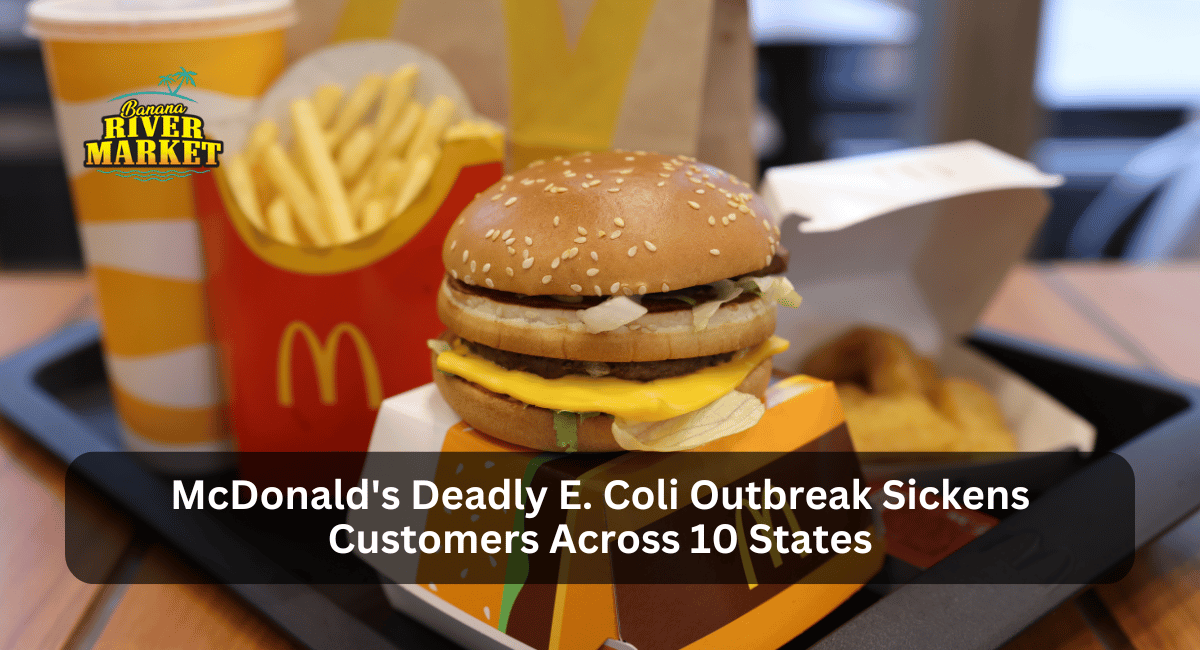A dangerous E. coli outbreak has been making headlines after leading to one death and sickening dozens across multiple states in the U.S. The Centers for Disease Control and Prevention (CDC) has launched an investigation, and McDonald’s hamburgers, particularly the Quarter Pounder, are suspected to be the cause of this serious health issue.
The Details of the Outbreak
As of October 22, the CDC reported that one person has died, 10 have been hospitalized, and a total of 49 people have fallen ill across 10 states. The affected states include Colorado, Kansas, Utah, Idaho, Iowa, Missouri, Montana, Nebraska, Nevada, New Mexico, and Oklahoma. Most of the people who have fallen ill mentioned eating McDonald’s Quarter Pounder hamburgers before they began experiencing symptoms.
The CDC has not confirmed which specific ingredient in the Quarter Pounder is responsible for the contamination, but it is believed to be linked to slivered onions used in the burger. These onions were sourced by a single supplier that provides products to three distribution centers.
McDonald’s Response to the Crisis
In an open letter, Cesar Piña, McDonald’s North America Chief Supply Chain Officer, emphasized that the company is taking swift and decisive action. McDonald’s is cooperating closely with the CDC to address the outbreak. As a precaution, the company has ordered its restaurants in affected areas to stop serving the potentially contaminated slivered onions.
Additionally, the Quarter Pounder has been temporarily removed from McDonald’s menus in the impacted states, which include Colorado, Kansas, and Utah, as well as parts of Idaho, Iowa, Missouri, Montana, Nebraska, Nevada, New Mexico, and Oklahoma.
Piña reassured the public that McDonald’s takes food safety very seriously and stated, “It’s the right thing to do.”
Other Menu Items Are Still Safe
While the Quarter Pounder is currently unavailable in some areas, McDonald’s has assured customers that other beef products remain safe to consume. These unaffected items include:
- Cheeseburger (300 calories)
- Hamburger (250 calories)
- Big Mac (590 calories)
- McDouble (390 calories)
- Double Cheeseburger (440 calories)
McDonald’s is actively working with its suppliers to restore the Quarter Pounder in the affected areas. However, the timeline for when it will be available again may vary depending on the location. The company has promised to provide regular updates to the public as they continue to manage the situation.
What You Need to Know About E. Coli
E. coli is a bacteria that can be harmful if ingested through contaminated food or water. It can also spread through contact with animals, other people, or certain environments. While anyone can be infected, certain groups are more vulnerable to severe illness from E. coli, including:
- Children younger than five
- Adults 65 or older
- People with weakened immune systems
- International travelers
The symptoms of an E. coli infection can vary, but common signs include:
- Fever higher than 102°F
- Severe diarrhea that lasts more than three days or is bloody
- Vomiting that prevents keeping down fluids
- Signs of dehydration, such as dizziness, dry mouth, or very little urination
If you or someone you know has eaten a McDonald’s Quarter Pounder and is experiencing any of these severe symptoms, the CDC advises you to contact your healthcare provider immediately.
How McDonald’s Plans to Move Forward
This E. coli outbreak has sparked major concerns for both McDonald’s and its customers. However, McDonald’s is taking steps to address the issue and protect its brand. The company’s focus right now is on food safety, working closely with health authorities to ensure that all contaminated ingredients are removed from their supply chain.
McDonald’s has also temporarily halted the sale of Quarter Pounders in regions where the outbreak has been reported and has removed the slivered onions from its menu in those areas. Piña noted that the company is committed to keeping customers informed and ensuring that the right safety measures are in place before reintroducing the Quarter Pounder in affected markets.
What This Means for McDonald’s Customers
While the outbreak is concerning, McDonald’s has made it clear that they are actively handling the situation. Customers can expect the temporary unavailability of the Quarter Pounder in several states until the investigation is complete and the affected ingredients are removed from the supply chain.
The company’s actions show a strong commitment to customer safety, and McDonald’s is working to minimize the impact on its loyal customers. For now, those living in the affected areas can continue to enjoy other McDonald’s favorites without worry, as the outbreak seems to be limited to the Quarter Pounder burger and potentially its slivered onions.
Preventing Future Outbreaks
This situation serves as a reminder of the importance of food safety and the role that companies and health agencies play in protecting consumers. While McDonald’s is working hard to resolve the current outbreak, it’s critical for all food establishments to maintain rigorous safety standards, especially when it comes to preventing contamination.
The CDC, in cooperation with McDonald’s and the supplier, will continue its investigation to pinpoint the exact source of the contamination. Until then, both McDonald’s and health authorities will closely monitor the situation to prevent further illnesses.
Conclusion
The E. coli outbreak tied to McDonald’s Quarter Pounders is a serious issue that has impacted customers across multiple states. With one death and dozens of people falling ill, McDonald’s has taken immediate steps to address the problem, including removing the potentially contaminated ingredient and halting sales of the burger in certain regions.
While this is undoubtedly a troubling event, McDonald’s commitment to food safety is evident in their swift actions. Customers in affected areas should remain vigilant and monitor for any symptoms if they have recently eaten a Quarter Pounder, but can feel reassured that the company is working diligently to resolve the issue and ensure the safety of its food.

